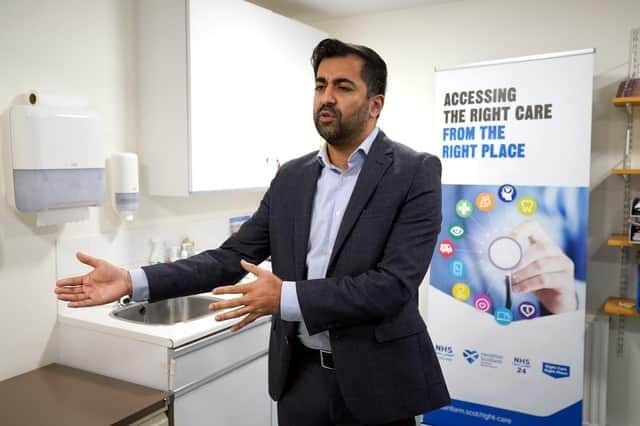Strikes by nurses could be ‘catastrophic’ but they are not inevitable – Humza Yousaf
He said Conservative ministers at Westminster have a “moral obligation” to “put their hand in their pocket” and allocate extra funding so the Scottish Government can settle the pay dispute.
Ministers at Holyrood have been clear they have no additional resources to increase pay beyond what has been offered to NHS staff.
Advertisement
Hide AdAdvertisement
Hide AdDespite that, Mr Yousaf said he will be “picking up the phone” to leaders of the Royal College of Nursing (RCN) in Scotland after its members voted for walkouts, and he vowed to work “flat out in every waking moment to try to avert those strikes”.


Speaking on BBC Radio Scotland’s Good Morning Scotland programme, Mr Yousaf said: “I do genuinely believe we can avert strike action this winter.”
His comments came after RCN members in every health board in Scotland backed industrial action, despite the Scottish Government saying it had offered a record pay rise that would result in NHS staff receiving an average increase of 7%, with lower paid workers getting 11%.
Mr Yousaf said ministers had to “reprofile” cash from other parts of the health budget for that deal, taking funds away from social care, primary care and mental health services.
He pledged “continued dialogue” with the RCN and other health unions – some of whom have already voted for strike action while others are still balloting members on the issue.
Mr Yousaf said: “There is a route through this, strikes are not inevitable.”
Talks could consider if there is a different way the £480 million available for NHS pay rises could be distributed amongst staff, he said.
But he added: “The other plea I am making is given the UK Government are the architects of high inflation costs and this cost crisis, for me I think they have a moral obligation, quite frankly, to put their hand in their pocket and provide more money to the Scottish Government in order for us to be able to afford these record high pay deals.”
Advertisement
Hide AdAdvertisement
Hide AdIf strikes do go ahead in the NHS this winter, they will be “catastrophic”, Mr Yousaf added.
The NHS is already facing a difficult winter, as services continue to recover from the Covid pandemic at a time of staff shortages.
Plans would be put in place for any industrial action, but Mr Yousaf warned: “Even with all the contingency we can possibly muster I think a strike would be harmful and I think it would be catastrophic, at this time more than any other time.”
RCN Scotland director Colin Pullman insisted nurses cannot accept another real terms pay cut.
He told BBC Radio Scotland: “There’s been years of under-investment in nursing, over a decade of pay cuts in real terms. The current offer is a pay cut again.
“At the end of the day I absolutely understand this is going to be difficult, our members acknowledge that.
“But what we can’t have is another real terms pay cut for the nurses of Scotland.
“There’s never a good time to strike, we don’t want to strike, but our members have told us very loudly that enough is enough.
Advertisement
Hide AdAdvertisement
Hide Ad“There is one way to avert strikes and that is to go back to negotiations and for us to negotiate an improved offer.”
RCN Scotland board member Hilary Nelson stressed any strikes will be carried out “safely”, although she acknowledged they will be “disruptive”.
She added: “We will make sure we are giving our message to the Government very clearly – ‘enough is enough’.”
She said staffing levels mean “people are already at risk”, adding: “Industrial action won’t create any additional risk, because we will work carefully with employers.”
The dispute is about patient safety as well as pay, Ms Nelson stressed, as she told how “exhausted” nurses routinely go to work knowing departments are short-staffed.
She said: “The main reason we are doing this is because we are standing up for our patients, we need to make sure there are enough nurses in place so we can carry on delivering services.”